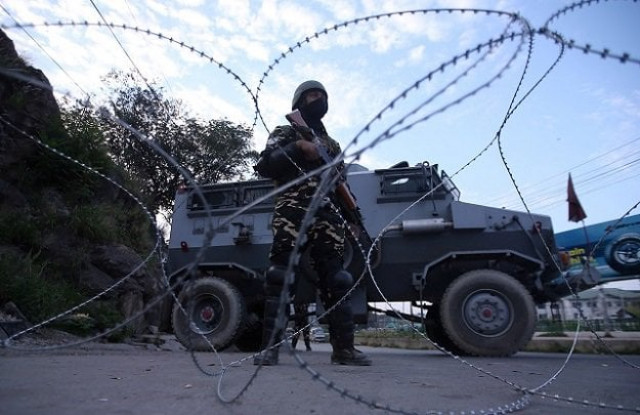Big money behind wars
In Modi’s newspeak, Indian nationalism is the new N-word and equals Nazism

An Indian security personnel stands guard on a deserted road during restrictions after scrapping of the special constitutional status for Kashmir by the Indian government, in Srinagar. PHOTO: REUTERS.
It is known that the Indian air force, navy and army always had serious coordination issues in the battlefield. The IAF wasn’t given any role in the 1962 war with China, while the navy wasn’t even aware of the planned attack on Pakistan during the 1965 war. The Kargil conflict was again a mess and the recent post-Pulwama incidents exposed the lack of synergy in operational plans of the Indian forces. In a bid to address these problems, PM Modi unveiled the new post of Chief of the Defence Staff (CDS), in his August 15 address — a move that will replace the Chairman of the Chiefs of Staff Committee (CoSC) position permanently. The CDS will act as a single-point military adviser to the PM and as a senior to other chiefs, and wield significantly more power than the former CoSC who was treated as the first among equals. In a fashion similar to the American and Chinese military, India will roll out a theatre system for integration in its military operations, given its long coastlines and complex geopolitical interests. A tri-service joint planning staff headquarters is also proposed to assist the CDS.
It is however interesting to note that the CDS will act as a focal person for the defence ministry on military acquisitions and procurements, thereby bypassing a lot of red tape.
Under Modi’s regime, Indian defence exports have grown from Rs10.5 billion in 2016-17 to Rs107 billion in 2018-19 despite most of its industrial complexes being involved in lower-technology defence production and export to countries like Sri Lanka and Mauritius. The private sector’s contribution to defence production is around 20% but this figure is expected to increase after liberalisation of the FSI policy in the defence sector. However, Indian produced equipment is usually exported. In 2018, the Indian army rejected indigenously produced rifles for the second-time for poor quality. Similarly Indian-origin tanks, aircraft and armour are not used on Pakistani borders because of quality and performance issues.
Despite having the world’s fifth-largest defence budget at over $60 billion and a large military industrial complex, India’s ability to equip its own army remains woeful as the military is approximately 40% self-reliant. Indian MiG-21s or “flying coffins” have been obsolete for decades and India is awaiting the first batch of Rafale aircraft next month from France. Though India has been aggressively marketing its BrahMos missiles to Thailand, Vietnam and Indonesia, the fact is that more than 70% of its missile components are of Russian origin and any sales will add to its import bill. India is also the second-largest importer of arms after Saudi Arabia. Its imports are driven by short-term modernisation impulses and not long-term objectives of technology transfer. Though the US recently elevated India to a Strategic Trade Authorization (STA) Tier 1 country, India lacks funds to equip its forces with fourth- and fifth-generation warfare.
In a nut shell, Modi’s war economy has led South Asia’s future hanging in the balance. He talks about reform, but his vision is pinched when it comes to eliminating pork-barrel spending on defence imports — digging the country into a deeper fiscal hole. India must constrain her worst impulses of becoming a leading defence player and instead protect its constitution, the justice system and the separation of powers that have come under relentless attack by India’s own body politic.
Published in The Express Tribune, September 4th, 2019.
Like Opinion & Editorial on Facebook, follow @ETOpEd on Twitter to receive all updates on all our daily pieces.















COMMENTS
Comments are moderated and generally will be posted if they are on-topic and not abusive.
For more information, please see our Comments FAQ